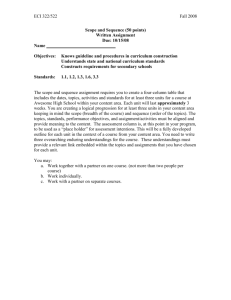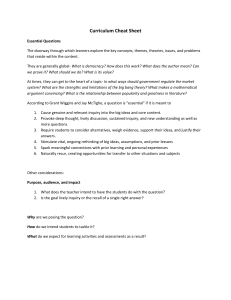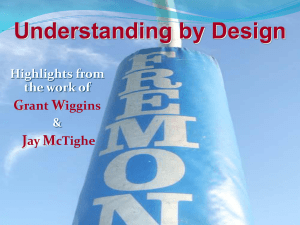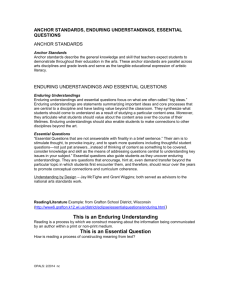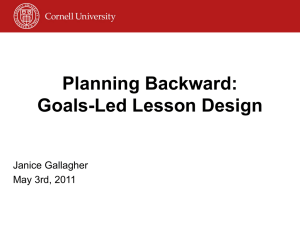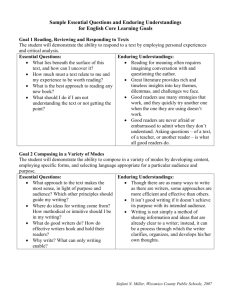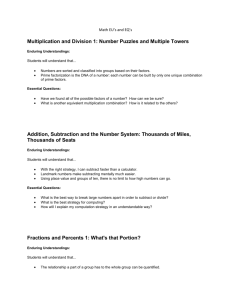Whole school planning for enduring understandings
advertisement
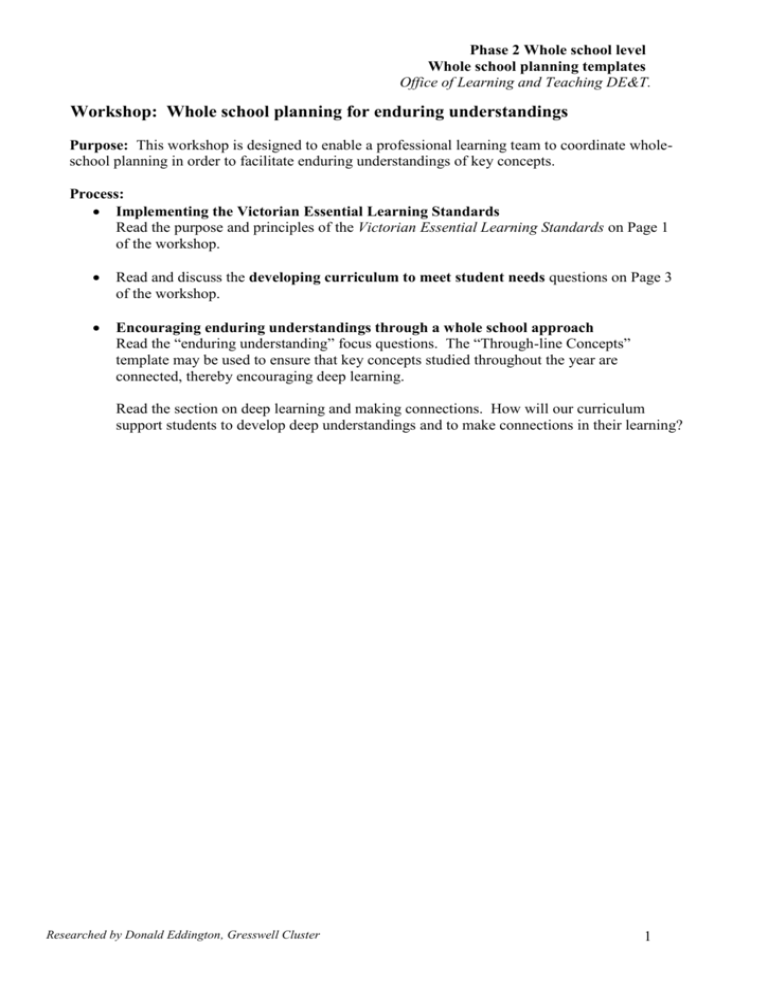
Phase 2 Whole school level Whole school planning templates Office of Learning and Teaching DE&T. Workshop: Whole school planning for enduring understandings Purpose: This workshop is designed to enable a professional learning team to coordinate wholeschool planning in order to facilitate enduring understandings of key concepts. Process: Implementing the Victorian Essential Learning Standards Read the purpose and principles of the Victorian Essential Learning Standards on Page 1 of the workshop. Read and discuss the developing curriculum to meet student needs questions on Page 3 of the workshop. Encouraging enduring understandings through a whole school approach Read the “enduring understanding” focus questions. The “Through-line Concepts” template may be used to ensure that key concepts studied throughout the year are connected, thereby encouraging deep learning. Read the section on deep learning and making connections. How will our curriculum support students to develop deep understandings and to make connections in their learning? Researched by Donald Eddington, Gresswell Cluster 1 Phase 2 Whole school level Whole school planning templates Office of Learning and Teaching DE&T. Workshop: Whole School Planning for Enduring Understandings PURPOSE AND PRINCIPLES OF THE VICTORIAN ESSSENTIAL LEARNING STANDARDS Purpose of the Victorian Essential Learning Standards The Victorian Essential Learning Standards propose that students need to develop a set of knowledge, skills and behaviours which will prepare them for success in a world which is complex, rapidly changing, rich in information and communications technology, demanding highorder knowledge and understanding and increasingly global in its outlook and influences. To succeed in that world, students will need to create a future which: Is sustainable – developing an understanding of the interaction between social, economic and environmental systems and how to manage them. Is innovative – developing the skills to solve new problems using a range of different approaches to create unique solutions. Builds strong communities – by building common purposes and values and by promoting mutual responsibility and trust in a diverse socio-cultural community. Each of these purposes is embedded within the three core strands of the Victorian Essential Learning Standards, and each will be the subject of both specific standards and associated sample teaching materials. Principles of the Victorian Essential Learning Standards A clear set of educational principles which reflects the community's expectations for schooling in Victoria underpins the Victorian Essential Learning Standards. Specifically, these principles are: Learning for all – proceeding on the basis that all students can learn given sufficient time and support, and that good schools and good teaching make a positive difference to student outcomes Pursuit of excellence – seeking to accomplish something noteworthy and admirable individually and collectively, and performing at one's best Engagement and effort – acknowledging that student ability is only one factor in achievement and that if students work hard and make an effort, they improve Respect for evidence – seeking understanding and truth through structured inquiry and the application of evidence to test and question beliefs Openness of mind – being willing to consider a range of different views and consider different ways in which evidence is perceived and solutions can be reached. This set of principles infuses the Victorian Essential Learning Standards and the associated support materials, and should also inform the detailed implementation decisions made by schools. Researched by Donald Eddington, Gresswell Cluster 2 Phase 2 Whole school level Whole school planning templates Office of Learning and Teaching DE&T. Developing Curriculum to meet Student Needs Using the School Level Report (SLR) and other relevant evidence, what are the considerations for curriculum planning outcomes at the whole school level? Using the School Level Report (SLR) and other relevant evidence, what are the considerations for curriculum planning outcomes at the program and student groupings level? Using an individual student's data and evidence, what are the considerations for this student's learning outcomes? Encouraging Enduring Understandings Through a Whole-school Approach What do you think your students will remember of your class in 5 years? 10 years? 20 years? Developing a whole school approach What are the big ideas that you want your students to understand? The “through-line concepts” template (page 5) may be used to ensure that key concepts studied throughout the year are connected, thereby encouraging deep learning. What are some learning contexts that will bring together the needs of the students, the values, beliefs and understandings of the school community and the Victorian Essential Learning Standards? (Curriculum Planning Guidelines, Phase 2: Planning & resourcing, http://www.sofweb.vic.edu.au/blueprint/fs1/guidelines/phase2/PSG/process%20pages/keylearningideaspsg.asp) Deep learning Students taking a surface approach are mainly concerned with comprehension and reproduction of knowledge (rote learning) in order to pass a test or complete an assessment task. They will often forget what they have learned as soon as the unit/term/course is over. Students who take a deep approach try to incorporate the new information with existing knowledge and experience. These students are intrinsically motivated and interested in learning. They actively take the information and examine it, interact with it and try to relate it to what they already know. They try to see the relationships between the concepts. Deep learning is characterised by: - intention to understand the material - interacting vigorously and critically with content - relating ideas to previous knowledge/experience. (Charles Sturt University, http://www.csu.edu.au/division/celt/html/dev_flex/dflr6.htm) Making connections Help students to look for patterns, explore relationships and make explicit connections between important concepts, processes and skills. This is too important to be left to chance. Researched by Donald Eddington, Gresswell Cluster 3 Phase 2 Whole school level Whole school planning templates Office of Learning and Teaching DE&T. Place a focus on transfer connections between domains / units of work. Many students think in 'episodic images.' That is, they do not necessarily realise that one concept from a domain, one unit of work or one curriculum area is connected to another in any shape or form. When planning, teachers need to explore ways to make links between enduring understandings / through-line concepts. Engage learners in making personally relevant connections - to themselves as people, to their learning and their lives. (Professional Learning Online Tool, http://www.plotpd.com) Researched by Donald Eddington, Gresswell Cluster 4 Phase 2 Whole school level Whole school planning templates Office of Learning and Teaching DE&T. Whole School Curriculum Planning: Victorian Essential Learning Standards Enduring understandings / Through-line concepts Term 1 – Enduring understandings / Through-line concepts Term 2 – Enduring understandings / Through-line concepts Term 3 – Enduring understandings / Through-line concepts Term 4 – Enduring understandings / Through-line concepts Researched by Donald Eddington, Gresswell Cluster 5
